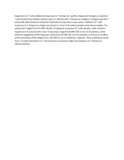| dc.contributor.author | Chemtai, AK | |
| dc.contributor.author | Okelo, GBA | |
| dc.date.accessioned | 2015-04-08T06:31:16Z | |
| dc.date.available | 2015-04-08T06:31:16Z | |
| dc.date.issued | 1989 | |
| dc.identifier.citation | East African Medical Journal 1989 Vol. 66 No. 12 pp. 787-791 | en_US |
| dc.identifier.uri | http://www.cabdirect.org/abstracts/19910871222.html?resultNumber=11&start=10&q=au%3A%22Okelo%2C+G.+B.+A.%22 | |
| dc.identifier.uri | http://hdl.handle.net/11295/81922 | |
| dc.description.abstract | Suppression of T-cell proliferative responses to P. falciparum specific antigen and mitogens is reported. T-cells derived from malaria patients were co-cultured with P. falciparum antigen or mitogens and the T-cell activity determined by radioactive thymidine incorporation assay system. Inhibition of T-cell responses to P. falciparum antigen was found in 13 out of 24 malaria patients from Kenya studied. The suppression ranged from 4%-60%. Results of mitogenic responses of T-cells showed a wide variation. Suppression of concanavalin A (Con A) responses ranged from 48%-64% (4 out of 10 patients), while phytohaemagglutinin (PHA) responses varied from 4%-60% (8 out of 10 patients), and those of purified protein derivative (PPD) antigen from 12%-44% (3 out of 6 patients). Together, these preliminary results show a marked impairment in T-cell responses to parasite antigen and mitogens in P. falciparum infected patients. | en_US |
| dc.language.iso | en | en_US |
| dc.publisher | University of Nairobi | en_US |
| dc.title | Suppression of T-cell proliferative response in Plasmodium falciparum malaria patients - preliminary results | en_US |
| dc.type | Article | en_US |
| dc.type.material | en | en_US |

